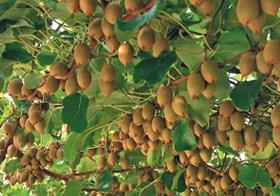
The New Zealand kiwifruit industry sequesters around 90,000 tonnes of carbon in soil annually, according to a new report by PlusGroup Research and Plant & Food Research – around one-third more carbon than the same area of adjacent pasture.
The project, funded by New Zealand single-desk kiwifruit marketer Zespri and the Ministry for Primary Industries’ Sustainable Farming Fund, measured soil organic carbon in 104 orchards across the country’s kiwifruit-growing regions and estimated the rate at which kiwifruit vines convert atmospheric carbon dioxide to soil organic carbon in a process known as carbon sequestration.
“We found soil nine metres below a 30-year-old kiwifruit orchard had significantly higher levels of carbon than pasture soil at the same depth,” said Alistair Mowat, Zespri innovation leader for sustainability. “Essentially, we are growing new soil at depth.”
“This has important implications for the industry – global retailers are looking for food suppliers which are more resilient to extreme events like flooding and drought. Soil carbon is a critical factor here, as the carbon content of soils is a clear indicator of soil health.”
Increased soil carbon means an increase in the water-holding capacity of the soil, which helps buffer crops against extreme weather events such as heavy rain or drought. More soil carbon also helps orchards withstand soil loss and improves soil aeration, as well as improving the efficiency of water and nutrient use, leading to lower costs for growers.
“Sequestering carbon from the atmosphere into the soil also helps offset the carbon emissions involved in growing and distributing kiwifruit. Produce from New Zealand is regarded as ‘clean and green’ and it’s work like this which helps us verify those claims,” said Mowat.
Growers could use this understanding of the soil organic carbon profile of their orchards to improve and maintain carbon levels, which would have significant benefits for surrounding land and downstream waterways. This may mean less nitrogen is applied and less irrigation is needed, as more water is retained in the soil. This approach to land management would fit well with the findings of the recent report from the Land and Water Forum, to which Zespri contributed.



